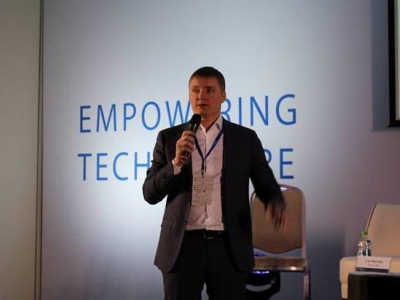CoinFox has spoken to one of the most prominent Russian bitcoin enthusiasts and the head of Humaniq about his new project.
CoinFox: Alex, when did you become acquainted with bitcoin?
Alex Fork: Around four years ago, I had some money to invest and people on a forum I frequented kept telling me I should get into bitcoin mining. I did some research, started mining, and met a lot of fascinating people in the blockchain community I have a deep respect for. I was hooked from the beginning.
CF: When did you come across the idea to create Humaniq?
AF: In February 2016, I got a chance to interview Vitalik Buterin and we discussed the challenges of charity and its relation to the blockchain technology. After this conversation, I dived into the problem much deeper and found that there was a huge opportunity to provide banking services to the underserved population. Every new startup should fill a niche that currently is not filled, and I felt I could build a team to do it. I was also well aware of the challenges charities and NGOs experience trying to give assistance to those in need and the frustration of donors who see too much of their generosity being spent for an expensive office space in Manhattan or London rather than helping the intended recipients. I realised that there was an opportunity in this niche to create a successful business service that could also be very effective in solving the aforementioned problems that charity organisations and donors face.
CF: Why did you choose Ethereum blockchain over bitcoin blockchain?
AF: Our business model requires it. We’re building a network that other companies are supposed to connect to, and that needs to be as easy and secure as possible. Bitcoin has several limitations as to adding additional services to it, which is one of the main reasons Ethereum was created. With Etherium, it’s much, much easier to develop and implement applications and addons.
CF: Your project is neither first nor the last that strives to bring the unbanked millions of people into the blockchain economy. What is unique about Humaniq that will lead to the success of the project in the highly competitive market?
AF: Biometric ID to create user accounts and sign transactions, as well as a simple and intuitive interface that can be used by anybody regardless of language or level of literacy.We believe that our mobile app and ecosystem is going to be more attractive not only to users but also to third party service providers and local partners. Through local partnerships in Africa and elsewhere, we’re developing a ground game to help increase the adoption of our project. We’re going to be an amazing mobile banking service, but we’re also offering access to a great number of other services through our partners that will be tied into the platform. That what makes us feel confident that we can compete and succeed in this market.
CF: When do you expect to bring the first 100,000 unbanked into the blockchain economy through Humaniq?
AF: We’re looking to launch in July 2017, and then do a hard push in September 2017. I can’t give you a specific date, but I would say that we’re pretty sure we’ll have 100,000+ users relatively soon after the launch. And since the business model is exponential, we can scale upwards very quickly.













